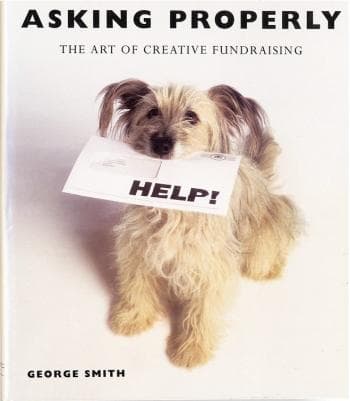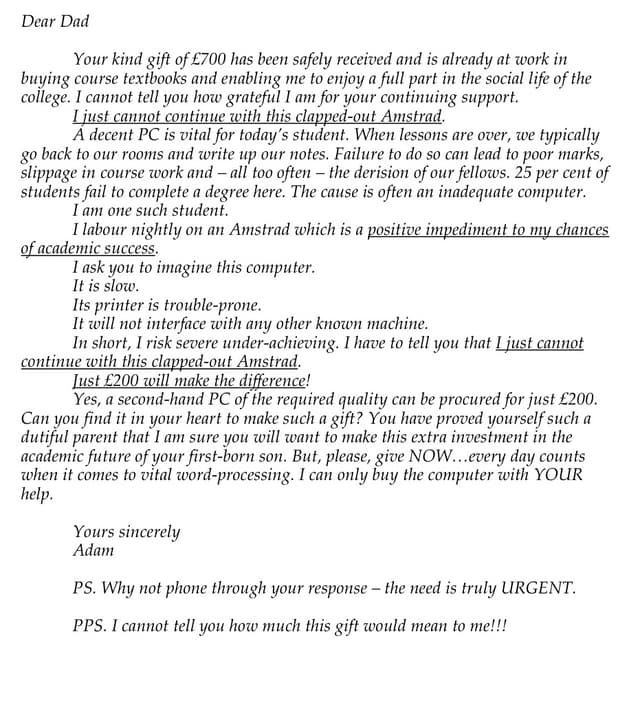Asking Properly: the art of creative fundraising
- Written by
- Charlie Hulme
- Added
- June 03, 2013
Book review
Asking Properly: the art of creative fundraising by George Smith
Reviewed for SOFII by Charlie Hulme
That which has been is what will be.
That which is done is what will be done.
And there is nothing new under the sun.

I guarantee if you read this book you’ll find 99.9 per cent of the questions you wish you had answers for were actually answered years ago. And you know that test you’re too cautious to try? George has already done it and will share results with you.
Asking Properly is a rare treat: an absolute master of his craft frankly sharing experience and well-entitled opinion on the art of fundraising. Every page contains practical lessons on how to write, design and use the various channels for fundraising.
But on top of that this book solves all of our fundraising problems by clarifying what our real problem is…
We’re not asking properly.
No, surely not? What about the economy? The over-crowded market place? The (insert excuse here...) Well, yes, but once we accept the things we cannot change we can focus on the things we can.
George Smith was ‘one of the prime movers in some of the most innovative, world-changing thinking, writing and campaigning in the UK in the last 50 years’. Let’s ask him to review us.
All quotations are from Asking Properly. Use them as a mirror. You may despair at times, but don’t worry; if you see where you’re going wrong, Asking Properly will put it right.
Where do we start?
All of us think we know who gives and why. But what do we really know about our audience? We know how we categorise them. We know how they are supposed to behave. The trouble is they usually don’t conform to type and we’re left scratching our heads. Why?
George bemoans our ‘unthinking allegiance to the language of the database’; packaging whole swathes of the population as being of identical mind and means. Who’d write a major donor appeal to an ‘indigent pensioner with an unemployed husband and four children away from home, who sweats it out in a part of inner London where credit is hard to come by’? Me neither, until you realise that’s how we categorise the Queen.
With our audience safely segmented we stopped listening to them and could ‘…beguile ourselves with the belief that the educated donor has finally arrived. This is a creature who gives to Oxfam because s/he appreciates the role of development in the South, who gives to WWF because s/he knows all about biological diversity, who gives to a cancer charity because s/he reads New Scientist…’
‘I would suggest that most people give to Oxfam because they want hungry people fed, that they give to WWF because they want tigers saved and that they give to Cancer Research UK because they know a cancer sufferer.’
We need to reassess the way we talk about our prospects before we can effectively talk to them.
‘Charities increasingly use the wrong word to describe people who give them money. They call them “supporter”, a comforting noun that suggests knowing commitment on the part of the donor. Sadly, it is often an over-statement of what has actually happened…
‘Yet we address letters to millions of people that begin “Dear Supporter”. Which is a bit like addressing a list of buyers of a washing-up liquid seized from the supermarket shelf as “Dear Fairy Liquid Buyer”. We look at results in bewilderment, wondering why our ‘supporters’ don’t support us.’
Not only that, we’ve decided for them how they’ll ‘support’ next. Someone ‘likes’ us on Facebook, clearly they’d like to give us some cash. They gave a cash gift so, of course, they’ll want to do that every month, etc.
The rigid way we categorise those who ‘support’ us is at best naivety, at worse hubris (a point subsequently proved by the UK Donor Commitment Study).
‘We call all this donor development. Does it ever occur to us that donors might not want to be developed?
‘I worry about the dead relationships on the way to this statistical Valhalla. But it’s ok, we’ve invented a word for that too: “attrition”… Again, it suggests a relationship that probably never existed in the first place.’
What’s the moral? ‘Never let anyone guide a fundraising programme with overdue deference to league tables, pie charts, or comparative data.’
The price we’ve paid for not listening is that people stopped listening to us.
 View original image
View original image
No one’s waiting by their phone for our call, or anxiously checking their inbox to see if we’ve mailed them. ‘The consumer does not separate the commercial mail from the fundraising mail.’
It’s a damning indictment to reflect that, ‘a company that had more former buyers than current buyers would probably withdraw that product.’
So how do we go about asking properly?
Do we know why we’re asking? ‘The horrid fact is that most fundraisers are raising money for reasons that they would have difficulty in articulating with precision.’
We know what we want but what does our prospect want? Yes ‘want’. ‘Donors want something in return for their donation or support. It matters little that the something is often cerebral or spiritual.’
What’s the ‘something’? ‘People want to change the world. Don't deny them the privilege.’ Anyone disagree? What is a donation really? Isn’t it an investment in my beliefs, value, and hopes? Why do you give? Isn’t it to start, stop, or change something?’
Our job is to show we’re the ones who’ll do that.
‘Shouldn’t be hard – curing cancer, ending child exploitation or saving the world should be pretty exciting!
‘Unfortunately we somehow decided there was a certain way to ask and began churning out endless appeals on “autoblag”. Our message became formulaic, predictable and dismissible. Which is why it gets dismissed.
‘The merest adventure, the smallest piece of pioneering will stand out from the crowd.’ Someone will always say “you can't do that”. They are almost always wrong. Novelty is not always a virtue. But innovation is a constant necessity.’
Do any of us disagree with George?
Of course not, his is the accepted wisdom we cited in our last job interview. If you’re having a hard time applying it in your job read Asking Properly. In the most entertaining and easy to follow way you’ll be taught by a master how to intelligently understand your prospects’ motivations and write constructive offers.
‘But it cannot teach you to care.
’You need to believe passionately in what you are doing if you are to fundraise successfully. And that’s really the whole point. What we produce may work, but it could have worked better.’
Can any of us say that we’re asking properly?
If you’re not convinced that you need this book, here’s what George’s contemporaries, colleagues and heirs say about Asking Properly.
 View original image
View original image
Mark Astarita, director of fundraising at the British Red Cross and chair of the Institute of Fundraising:
‘A masterpiece yet to be surpassed. Probably the best fundraising book ever.’
Rachel Beer, founding partner of the agency Beautiful World:
‘It's hard to believe how long ago this book was first published, because the content has barely dated and the insights and tips it contains are just as solid a lesson in the fundamentals of good fundraising as they were when it was written. It’s full of straightforward, no- nonsense advice that will make your fundraising appeals and communications work harder, no matter what the medium and, unlike many business books, it's a remarkably easy read. A must read for anyone starting out in fundraising.’
Neil Griffiths, managing director, Arts Emergency:
‘Asking Properly is the most important book I've ever read (professionally speaking). As a smart but inexperienced fundraiser, George’s pithy and warm writing gave me an invaluable glimpse through the dusty curtains of jargon and tradecraft to what popular fundraising is in reality. It's a welcome salve to all that believe veracity, common sense and creativity are vital in successful cause marketing.’
Craig Linton, head of fundraising, Royal London Society for the Blind:
‘Asking Properly is a book that is about much more than copy writing. For me it sets outs a fundraising philosophy that I both admire and want to emulate. It is one of the classic fundraising books and a must read for all aspiring fundraisers.’
Giles Pegram, consultant and former appeals director at the NSPCC:
‘The worst thing we do in fundraising is that we don’t ask properly. I was amazed at NSPCC to discover fundraisers with Oxbridge degrees who couldn't write a correct letter, let alone use the wonders of the English language to write a compelling ask for a gift.
‘George Smiths's book Asking Properly is simple, clear and full of nuggets of wisdom. If your job requires you to ask, in writing, this is essential reading. And as you would imagine from George, written with sardonic wit which is always funny, and sometimes hilarious."
Rob Woods, fundraising trainer and coach, winner of a national training award in 2010:
‘The most important thing I learned from this book is how crucial it is to write in a conversational tone. He told me to look at what I've written and ask myself, “Does it sound like someone speaking? If not, why not?” In the book George helps you both to understand why this shift in tone makes such a difference and, crucially, how to do it”.
Published by The White Lion Press Limited (http://www.whitelionpress.com), UK, reprinted 2004, hardback, 230 pages.
About Charlie Hulme
 Charlie Hulme is managing director of Donor Voice. He is an expert on taking the guesswork (and subsequent time, effort and money wasted) out of strategy. He helps charities dramatically improve performance, value and retention.
Charlie Hulme is managing director of Donor Voice. He is an expert on taking the guesswork (and subsequent time, effort and money wasted) out of strategy. He helps charities dramatically improve performance, value and retention.
Voted top speaker at the Institute of Fundraising’s National Convention in 2013, he writes frequently for SOFII, 101 Fundraising, the Institute of Fundraising and many others.


















